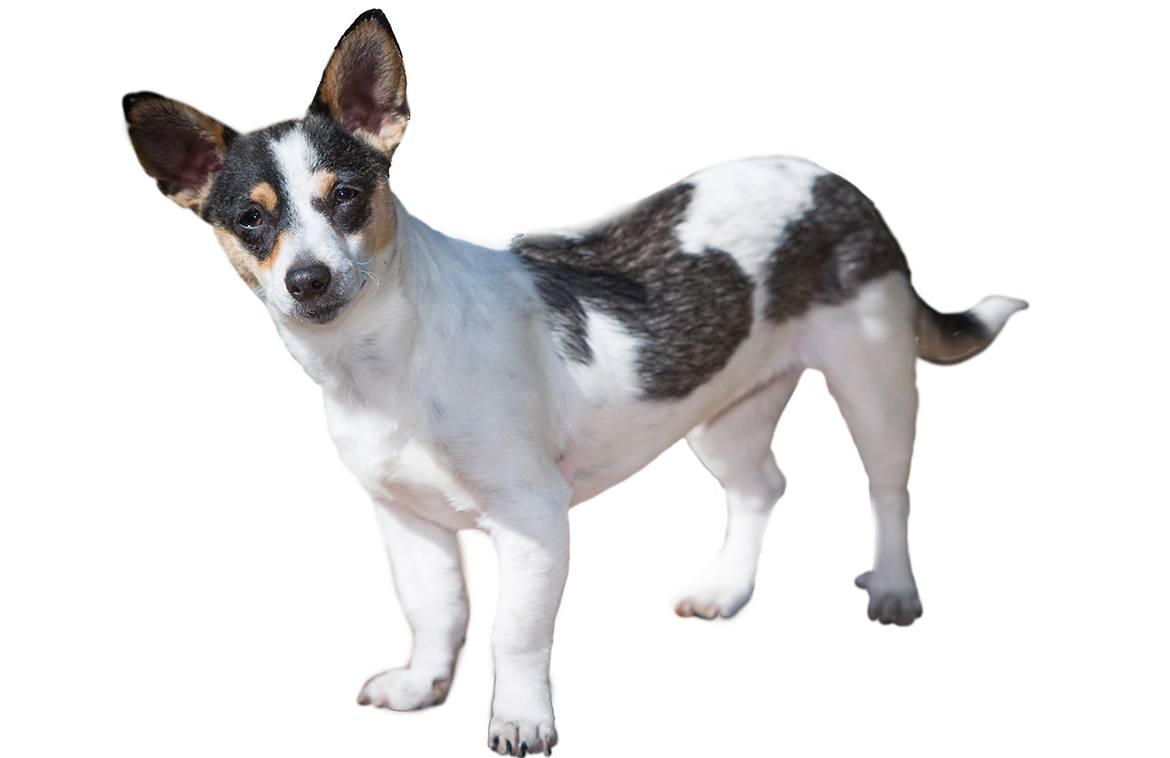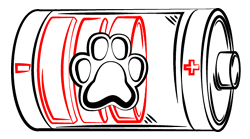
Paws ‘N’ Pups Quickview
Size
| Energy Level
| Trainability
| Paws ‘N’ Pups Rank
|
Characteristics
| Physical Characteristics: Height – Mini: 9-13” | Standard: 13-18” Weight: 10-24 lbs. Energy Level: Moderate – High | Colors: The American Kennel Club recognizes the Rat Terrier in the following colors:
|
Health & Longevity
Average Life Span: 12-18 years
Energetic and bouncy, the Rat Terrier is a rambunctious pup with a friendly nature and overall good health. But these purebreds have developed a few breed-specific, genetic health conditions over the years that might be of concern to a compassionate pet owner. Of course, Rat Terriers are also prone to developing the general health issues that any pup of any breed can suffer from, such as heartworms, heart disease, and some forms of cancer.
Patellar Luxation
This condition occurs when the kneecap dislocates from a groove in the thigh bone. Symptoms include obvious dislocation and an awkward, limping walk. If left untreated, it could cause permanent nerve and cartilage damage, as well as painful arthritis. A simple surgical procedure is the most common treatment method for this condition.
Seizures
This condition is usually a symptom of a more serious, underlying condition. It causes full-bodied tremors and neurological attacks, resulting in foaming at the mouth, violent shakes, rolling eyes, and immobility. This condition/symptom can be controlled with a cocktail of vet-prescribed medication. But your vet has to do a thorough examination to find the underlying cause and make a call on proper treatment from there.
Other health conditions that your Rat Terrier might encounter in their lifetime includes hip and elbow dysplasia, Legg-Calve-Perthes disease, and skin allergies. These pups also have a tendency to become chronic overeaters, so obesity-related health issues are possibilities. The average lifespan of a healthy Rat Terrier ranges from 15 to 18 years, which is considerably longer than the average purebred of any breed.
Temperament & Train-ability
Rat Terriers are friendly, playful, and rambunctious, but they can also be stubborn and challenging towards other dogs. These pups get along great with families, especially older children (9 years old and up). But other dogs, especially large dogs, pose a dominance threat to Rat Terriers. These small purebreds believe they are much larger than they are, resulting in their bucking up to bigger, more threatening dogs. Socialization from an early age is imperative to ensuring the tolerance, acceptance, and good behavior of your Rat Terrier with other pups.
The Rat Terrier is an active dog that would be great for fitness-minded families. However, if you are having a lazy day, a couple simple, long walks around the neighborhood would be enough to keep your pup healthy and happy. Dog parks are iffy because of the Rat Terrier’s “small dog syndrome,” unless your pup has been thoroughly socialized. But a fenced-in backyard would be ideal for your purebred to run free and explore.
As with socialization, it is best to train your Rat Terrier from an early age. These pups assume they are dominant, so you have to establish yourself as the leader of the pack before they will take you seriously. Once you’ve become the alpha to your Rat Terrier, compliance with your instructions will come easily. Be patient, determined, and positive. Never shout or lash out at your Rat Terrier.
Grooming
Rat Terriers are average shedders with fine hairs in a few layers of a short, sleek, smooth coat. These pups are easily groomed, daily, with a medium-bristled brush to gather excess hairs. Keep a vacuum handy for your clothes, furniture, and carpet in hot weather (shedding season). The Rat Terrier needs a bath whenever he gets very dirty or really smelly. Or every 6-8 weeks. Whichever comes first.
The most important part about the grooming regimen of a Rat Terrier is remembering to clean his ears once a week. These pups have wide-open, stand-up ears, so germs and debris often float into their canals, causing infections. Check your pup for ear infection signs, such as redness, pus, crustiness, and swollen tissue, regularly. Use warm water or a vet-prescribed cleaning solution, and a cotton swab, to gently clean the outer edges of each ear. Never push into the ear canal.
Diet
Rat Terriers are indeed small pups, but you wouldn’t guess that from their big appetites. These purebreds love to eat, so it comes as no surprise that your Rat Terrier could become a chronic overeater if given the chance. Avoid buying automatic feeders. It might seem like a very good idea, but those contribute the most to obesity-related health problems. Keep your Rat Terrier fit and healthy with a meal schedule where your pup can eat twice a day. For each meal, give him ½ cup of dry, high-quality kibble.
Use the above-mentioned information as merely a guide. Each Rat Terrier is different with different nutritional needs. Therefore, you should consult with your vet to learn more about the nutrients that your pup needs.
Looking for a Rat Terrier?
 Find A Rat Terrier Breeder |  Rat Terrier Puppies For Sale |  Adopt A Rat Terrier |
Cost
Fairly common in the dog world, Rat Terriers can often be found in local animal shelters, which is where you should begin your search. Call around first to see if any of your local animal shelters or rescue groups know of an adoptable Rat Terrier. Ask plenty of questions about his past circumstances, health histories, and general demeanor. From there, you can visit and make the decision to adopt your new companion.
Adoption fees vary from state, county, and shelter, but the overall average is between $75 and $250. Other services, such as the spay or neuter operations, updated vaccinations, and health check, will cost extra. Your general adoption fee could end around $400 to $550.
Rat Terrier breeders are easy to find, but you should check out the reputation of any breeder before investing in a new pup. When your prospective breeder proves to be compassionate, friendly, and trustworthy, ask about prices. On average, Rat Terrier puppies cost between $250 to $400. But you also have to consider long-term costs, such as toys, kibble, vaccinations, and regular vet check-ups.
Paws ‘N’ Pups Ranking
Paws ‘N’ Pups ranks every breed out of 4 with 1 being easiest to integrate into your life and 4 being the toughest – The lower the ranking the better.
Ranking takes into account a few basic factors including cost, skill level needed, high vs low maintenance and how critical regular training is to success. Rat Terriers earn a 2 on the integration scale. For families, these pups are great companions. They are friendly and loving towards children and adults, especially ones who they have grown up around. However, other dogs are a different matter. For the Rat Terrier, training and socialization could make or break the long-term behavior of your pup. Be diligent, positive, and patient. It will pay off in a well-behaved, well-trained, tolerant purebred.
Breeds Similar To Rat Terrier
 Manchester Terrier |  Jack Russell Terrier |  Toy Fox Terrier |  Fox Terrier |




